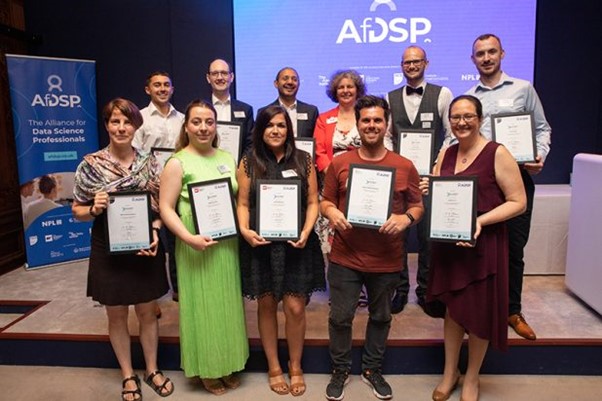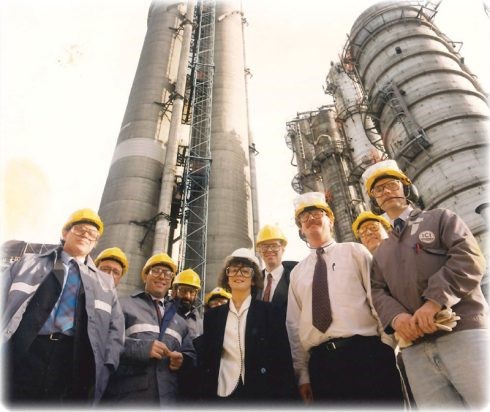Guest blog by Edward Rochead CMath FIMA
Chair of the Alliance for Data Science Professionals
I have recently been appointed as Chair of the Alliance for Data Science Professionals (AfDSP), following a selection process. This appointment came as something of a surprise, and certainly wasn’t part of any sort of ‘grand plan’ in my voluntary service (or what my wife calls my ‘semi-professional’ life). However, having chaired my first AfDSP board meeting, I am considering this opportunity a privilege and I am very much looking forward to leading the Alliance.
The AfDSP is an Alliance of professional bodies and data science employers, supported by the Royal Society and Royal Academy of Engineering. The AfDSP has defined the ‘Advanced Data Science Professional’ (ADSP) standard, which is equivalent to
Chartership and is awarded by any of the members – including the RSS – to a common standard. The AfDSP is working towards gaining Privy Council permission to convert the certification into a Chartership, as well as towards accrediting degrees.
I find myself in an odd position by taking the Chair of AfDSP, as I am not a data science professional. I consider myself a mathematician (proudly), and have spent a reasonable proportion of my career applying maths to operational research, and more recently leading and commissioning a wide range of STEM research, including in data science.
I first became aware of the importance of data in 2017, when I attended an event at the Royal Society that explored the power of data. Speakers – from organisations as diverse as the R&A (defining golf standards), Dyson and DreamWorks – explained how data was transforming the effectiveness of the work of their organisations. For instance, we learned that DreamWorks had, through data-driven digital engineering, reduced its production costs by 35% in the same period as increasing its productivity by three orders of magnitude.
 The first recipients of the Advanced Data Science Professional standard
The first recipients of the Advanced Data Science Professional standard
Since then, especially in my time as an expert panel member for the
Bond Review, I have become increasingly interested in the ubiquity of data and its importance in every sector of society. Given my interest in data, and what now feels like serendipity, I attended the ceremony in 2022 at which the first cohort of ADSPs were awarded their certificates (see photo above).
Data has been important for as long as humanity has used number. Since my appointment as Chair, I have already heard some interesting anecdotes about data. I was particularly taken by a recollection from my Loughborough University colleague, Carole Smith (see photo below), who in the 1980s managed a chemical plant, which was getting pretty elderly and unreliable.
 Carole with her team at the chemical plant in the 1980s
Carole with her team at the chemical plant in the 1980s
Carole used data from the various systems in the plant to identify the key bottlenecks, leading to a programme to change employee behaviours, especially around cross department working and knowledge sharing. Carole’s work made the plant much more reliable and resulted in the following specific benefits (at 1980s values):
- Saving £4 m per year through increased production, i.e. better quality processes driven by the data, leading to less waste
- saving £2.6 m per year through reduced energy consumption and better final product quality
- saving £80 k per year through fewer pump overhauls (what we would now call ‘predictive maintenance’)
- improving plant health and safety, employee morale and enabling better business planning
Overall throughput increased by 23% and losses to by-products reduced by 75%, all through the power of data.
I interviewed Karen Walker of Dstl (see photo below), who achieved Advanced Data Science Professional status in 2023. I asked what motivated her to become an ADSP. She said:
‘I’ve worked in various data-related roles for a long time and moved into a data science role nearly ten years ago, so I thought the ADSP accreditation would be a great opportunity for me to demonstrate both my experience and my ethical approach to my work.’
I then asked how she found the process.
‘It took me a bit of time to review which parts of my experience relate to different parts of the Alliance for Data Science Professional standards. I decided to describe one project I’d worked on for each skill area, weaving my ethical and reflective approach throughout. It took me a few weeks to finalise my application and I found out that I’d been successful five weeks after submitting it.’
I asked what she would say to anyone considering applying for ADSP.
‘Go for it! Data science and artificial intelligence are such fast-moving areas that it’s vital for the public to have confidence in data scientists’ work. Achieving accreditation as an ADSP recognises that professional competence.’
I finished our conversation by asking Karen what the ADSP means to her.
‘I’m incredibly proud to be one of the first people to achieve this new accreditation which demonstrates my experience and professional capability. Data science is such a mix of different skills that it hadn’t felt natural to apply for the Chartership my professional body offered before this accreditation was available – now I feel that I fit in!’
When I heard Karen’s final comment I felt really proud to be associated with the AfDSP. It not only benefits those data science professionals – whose backgrounds may be in mathematics, statistics, computer science, operational research – but also supports the increasing number of professionals in other disciplines who are using data science skills as part of their work. The AfDSP introduces new inclusivity into a profession that didn’t previously have a natural home.
 Karen at a Dstl/Google Hackathon
Karen at a Dstl/Google Hackathon
I have long held the personal view that a large proportion of creativity and innovation happens at the interfaces between subject areas, and in a way the AfDSP has exemplified that, with (initially) four professional bodies (the
IMA,
BCS,
ORS and
RSS) working together to create a common standard for people working at the interfaces of their respective disciplines. Although I joined as Chair after much of the innovative groundwork had been done, I can see the immense efforts expended by those involved to develop a new cooperative (and cost-effective) model that benefits both the individuals, the employers and the professional bodies involved. I pay tribute to those who have led this work, especially my predecessor as Chair, Professor Rachel Hilliam.
To find out more about applying for certification as an ADSP, see the
IMA webpage or
Alliance website.
The author is grateful to Carole Smith (Loughborough University) and Karen Walker (Dstl) for their support in writing this article.
The views expressed in this article do not necessarily reflect those of Loughborough University, Dstl, the Ministry of Defence, nor any member of the AfDSP.
Reproduced from
Mathematics Today, June 2024
Download the article,
A Data – ahem – with Destiny (pdf)
Image credits:
First recipients of ADSP standard @
BCS |
Franhales
Chemical plant in the 1980s courtesy of Carole Smith
Karen at a Dstl/Google Hackathon, credit: Google